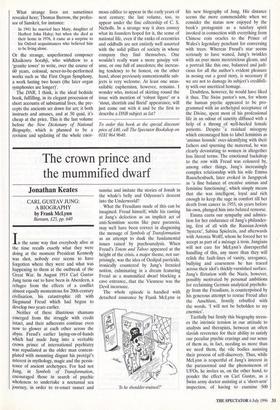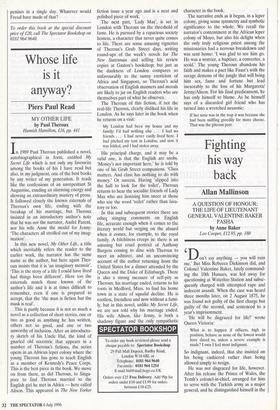The crown prince and the mummified dwarf
Jonathan Keates
CARL GUSTAV JUNG: A BIOGRAPHY by Frank McLynn Bantam, £25, pp. 640 In the same way that everybody alive at the time recalls exactly what they were doing at the moment President Kennedy was shot, nobody ever seems to have forgotten where they were and what was happening to them at the outbreak of the Great War. In August 1914 Carl Gustav Jung turns out to have been in Aberdeen, a refugee from the effects of a conflict almost equally momentous for 20th-century civilisation, his catastrophic rift with Siegmund Freud which had begun to develop two years earlier.
Neither of these illustrious shamans emerged from the struggle with credit intact, and their adherents continue even now to glower at each other across the abyss. Freud's earlier laying-on-of-hands which had made Jung into a veritable crown prince of international psychiatry was repudiated as the older man contem- plated with mounting disgust his protege's interest in mythology, magic and the persis- tence of ancient archetypes. For had not Jung, in Symbols of Transformation, encouraged those in search of psychic wholeness to undertake a nocturnal sea journey, in order to re-enact sunset and sunrise and imitate the stories of Jonah in the whale's belly and Odysseus's descent into the Underworld?
What the Freudians made of this can be imagined. Freud himself, while his ranting at Jung's defection as an implicit act of anti-Semitism seems like pure paranoia, may well have been correct in diagnosing the message of Symbols of Transformation as an attempt to duok the fundamental issues raised by psychoanalysis. When Freud's Totem and Taboo appeared at the height of the crisis, a major theme, not sur- prisingly, was the idea of Oedipal parricide, ironically countered by Jung's frenzied notion, culminating in a dream featuring Freud as a mummified dwarf blocking a cave entrance„that the Viennese was the Devil incarnate.
The whole episode is handled with detached assurance by Frank McLynn in
'Is he shoulder-trained?' his new biography of Jung. His distance seems the more commendable when we consider the status now enjoyed by the book's protagonist as a tutelary spirit invoked in connection with everything from Chinese coin oracles to the Prince of Wales's legendary penchant for conversing with trees. Whereas Freud's star seems seriously to have waned, Jung's twinkles with an ever more meretricious gleam, and a portrait like this one, balanced and judi- cious for all the author's evident pleasure in nosing out a good story, is necessary if we are not to damage its subject's credibili- ty with our uncritical homage.
Doubtless, however, he would have liked it thus. The Swiss pastor's son, for whom the human psyche appeared to be pro- grammed with an archetypal acceptance of the Divine, spent most of his professional life in an odour of sanctity diffused with a help of a throng of well-heeled female patients. Despite % residual misogyny which encouraged him to label feminists as 'animus hounds' over-identifying with their fathers and spurning the maternal, he was clearly devastating to women in altogether less literal terms. The emotional backdrop to the row with Freud was coloured by, among other things, Jung's increasingly complex relationship with his wife Emma Rauschenbach, later evoked in Jungspeak as 'a fine balance of creative animus and feminine functioning', which simply means that she was intelligent, loyal and rich enough to keep the sage in comfort till her death from cancer in 1955, six years before his own, plunged him into belated remorse.
Emma earns our sympathy and admira- tion for her endurance of Jung's philander- ing, first of all with the Russian-Jewish 'hysteric', Sabina Spielrein, and afterwards with Antonia Wolff, whom he forced her to accept as part of a menage a trois. Jungians will not care for McLynn's disrespectful handling of this, any more than they will relish the fault-lines of vanity, arrogance, bullying and coarseness he has traced across their idol's thickly-varnished surface. Jung's flirtation with the Nazis, however, possibly motivated by personal ambitions for reclaiming German analytical psycholo- gy from the Freudians, is counterpoised by his generous attempt to rescue Freud after the Anschluss, frostily rebuffed with the words, 'I will not be beholden to my enemies'.
Tactfully but firmly this biography stress- es the intrinsic tension in our attitude to analysts and therapists, between an often slavish reverence for their ability to satisfy our peculiar psychic cravings and our sense of them as, in fact, needing us more than we need them, file vile bodies assisting their process of self-discovery. Thus, while McLynn is respectful of Jung's interest in the paranormal and the phenoinenon of UFOs, he invites us, on the other hand, to ponder the effect on Carl Gustav, as a Swiss army doctor assisting at a 'short-arm' inspection, of having to examine 500 penises in a single day. Whatever would Freud have made of that?
To order this book at the special discount price of f20, call The Spectator Bookshop on 0181 964 9640.



























































 Previous page
Previous page